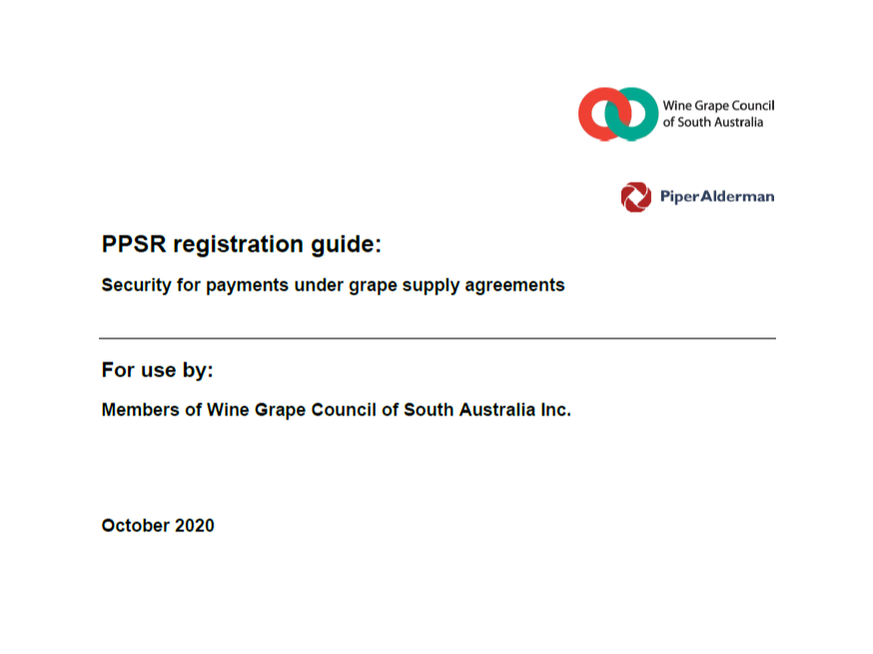Personal Property Security Register (PPSR)
|
The Wine Grape Council of South Australia has worked with Piper Alderman to develop a guide to help grape growers understand how to register security over grapes.
Taking security over grapes secures the winery's obligation to pay your invoices on time and in full. It is also important to take steps to ‘perfect’ that security interest to maximise your chances of being paid. If you don’t take security over the grapes that you sell to a winery (and any resulting wine product and sale proceeds), or you fail to ‘perfect’ that interest you may not be able to recover the unpaid purchase price for those grapes if the winery goes into liquidation. To learn more about why grape growers should register security over grapes, read below. Piper Alderman have also developed a step-by-step guide on how to register security over grapes just for WGCSA members which you can also download. |
Guide to register security over grapes |
What if I don’t take security over my grapes?
If you don’t take security over the grapes that you sell to a winery (and any resulting wine product and sale proceeds), or you fail to ‘perfect’ that interest you may not be able to recover the unpaid purchase price for those grapes if the winery goes into liquidation.
Instead, the liquidator (after making any required payments to secured creditors of the winery) will likely keep any remaining goods and sell them for the benefit of unpaid creditors of the winery as a whole. If that happens, there is no guarantee that your invoices will be paid by the liquidator in full. In fact, in many cases, there may not be sufficient surplus funds left over after payment of secured creditors and other priority payments to enable the liquidator to pay you anything at all.
Instead, the liquidator (after making any required payments to secured creditors of the winery) will likely keep any remaining goods and sell them for the benefit of unpaid creditors of the winery as a whole. If that happens, there is no guarantee that your invoices will be paid by the liquidator in full. In fact, in many cases, there may not be sufficient surplus funds left over after payment of secured creditors and other priority payments to enable the liquidator to pay you anything at all.
How do you take a security interest and ‘perfect’ it
Winemakers now generally require title in the grapes that they purchase to pass to the winery at the point of delivery because under the current WET regime, wineries must be considered to be the legal owner of those grapes immediately before crushing in order to qualify for a producer rebate. For this reason, the inclusion of a traditional ‘retention of title’ type of security in grape supply agreements is no longer acceptable to wineries.
To overcome this, growers can instead ask a winery to grant them a ‘security interest’ over the grapes they sell to the winery (together with proceeds). Where appropriately drafted, this security interest can serve a similar purpose to the traditional ‘retention of title’ security from the grower’s perspective, without precluding wineries from claiming a producer rebate on wine made from the relevant grapes.
Given that this type of security interest secures the unpaid purchase price of grapes sold by a grower to a winery, it is classed as a ‘purchase money security interest’ (‘PMSI’) under the relevant law (the Personal Property Securities Act 2009 (Cth) or ‘PPSA’). This means that growers are also able to take advantage of ‘super priority’ status given to PMSIs under the PPSA. This is important because PMSIs are usually given priority over other competing security interests in the same goods (even if they were registered first).
If you wish to take a security interest over grapes supplied by you to a winery and to ‘perfect’ that security in order to maximise your chances of being paid, the key steps to be completed are:
To overcome this, growers can instead ask a winery to grant them a ‘security interest’ over the grapes they sell to the winery (together with proceeds). Where appropriately drafted, this security interest can serve a similar purpose to the traditional ‘retention of title’ security from the grower’s perspective, without precluding wineries from claiming a producer rebate on wine made from the relevant grapes.
Given that this type of security interest secures the unpaid purchase price of grapes sold by a grower to a winery, it is classed as a ‘purchase money security interest’ (‘PMSI’) under the relevant law (the Personal Property Securities Act 2009 (Cth) or ‘PPSA’). This means that growers are also able to take advantage of ‘super priority’ status given to PMSIs under the PPSA. This is important because PMSIs are usually given priority over other competing security interests in the same goods (even if they were registered first).
If you wish to take a security interest over grapes supplied by you to a winery and to ‘perfect’ that security in order to maximise your chances of being paid, the key steps to be completed are:
- Include a security for payment clause in your grape supply agreement (see example clause below).
- Ensure the supply agreement is executed by all parties. This is important because the PPSA only allows you to register a security interest if the winery has agreed to provide that security interest to you.
- ‘Perfect’ the security interest by making a legally compliant registration against the winery on the public online register of security interests, known as the Personal Property Securities Register or ‘PPSR’.
In order for your registration to provide you with effective protection it must meet all prescribed requirements. To be afforded with ‘super priority’, it must also indicate that it is a PMSI and must comply with the timing requirements referred to below.
If you do not make a complying registration (or you do not make any registration), your security interest will be ‘unperfected’ at law, which will mean in the case of the insolvency of the winery, that your security interest is disregarded and you will be treated as an unsecured creditor of the winery. - Provide the winery with a copy of the Verification Statement generated by the PPSR when you made the registration as soon as reasonably practicable after the registration is made. This step is not required if your security for payment clause includes a waiver of this requirement (see 1.3 of the example clause below).
When should a registration be made?
In order to obtain the best possible protection, you will need to register your security interest on the PPSR:
- within 20 business days of entering a grape supply agreement (otherwise, if the winery goes into administration or liquidation at any time during the 6 month period after you make your registration, your security interest will be invalid); and
- before the first supply of grapes is made to the winery under the supply agreement (this is a prerequisite if you wish to obtain PMSI ‘super priority’ as described above).
What happens to my security once my grapes are combined with other grapes?
The PPSA includes specific rules which regulate how a security interest in your grapes will be treated once your grapes become unidentifiable within a larger mass (because they are combined with other grapes or are processed).
In short:
In short:
- your security interest continues in the combined mass as a whole (i.e. your security now captures all grapes within the mass and all wine product produced from those grapes);
- each other person who has a security interest over grapes that become commingled with your grapes (e.g. other secured growers) also obtains a security interest over the mass as a whole (including your grapes); and
- you and other secured parties will have a proportionate claim to any sale proceeds derived from the commingled grapes.
Example “grower” security interest clause
In this attachment we have included an example of a “grower” security interest clause which provides for a security interest of this nature.
If you require assistance in securing payment of your grape supply invoices or perfecting any security interest, you should contact a lawyer.
If you require assistance in securing payment of your grape supply invoices or perfecting any security interest, you should contact a lawyer.
Further information
This information has been prepared by Piper Alderman for WGCSA. For further information or related issues, please feel welcome to contact:
Disclaimer: This has been prepared as a general summary for your information only, without knowledge of or regard to your personal circumstances or any supply agreements which you may be a party to. This document is not intended to be, nor should it be relied upon as, formal legal advice. If you wish to consider taking further steps to secure payment of your grape supply invoices, you should consult a lawyer to determine an appropriate course of action.


